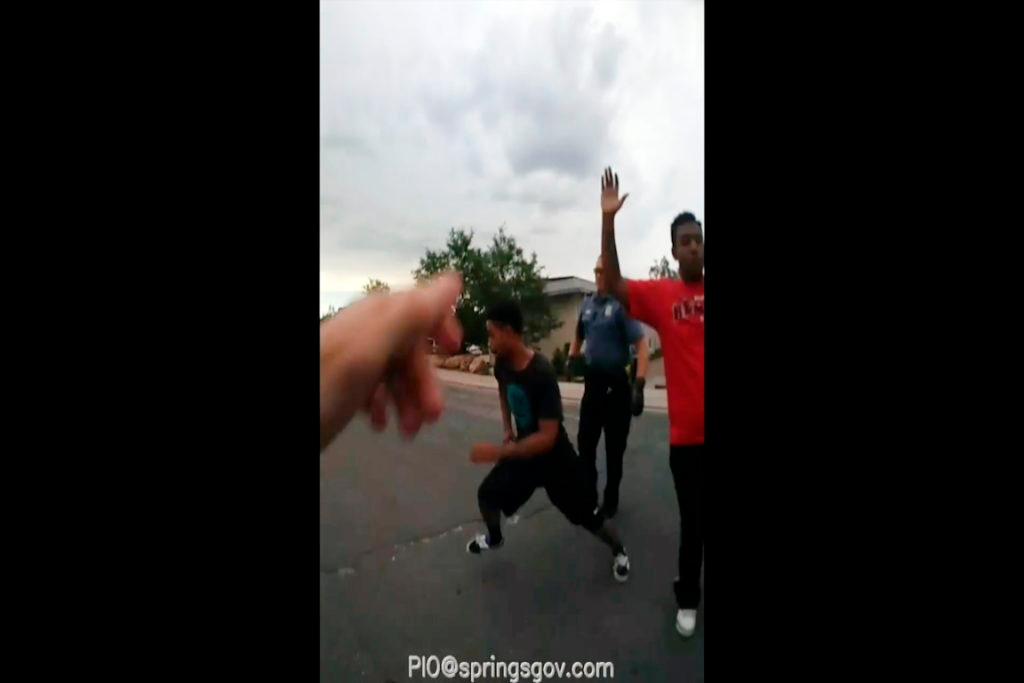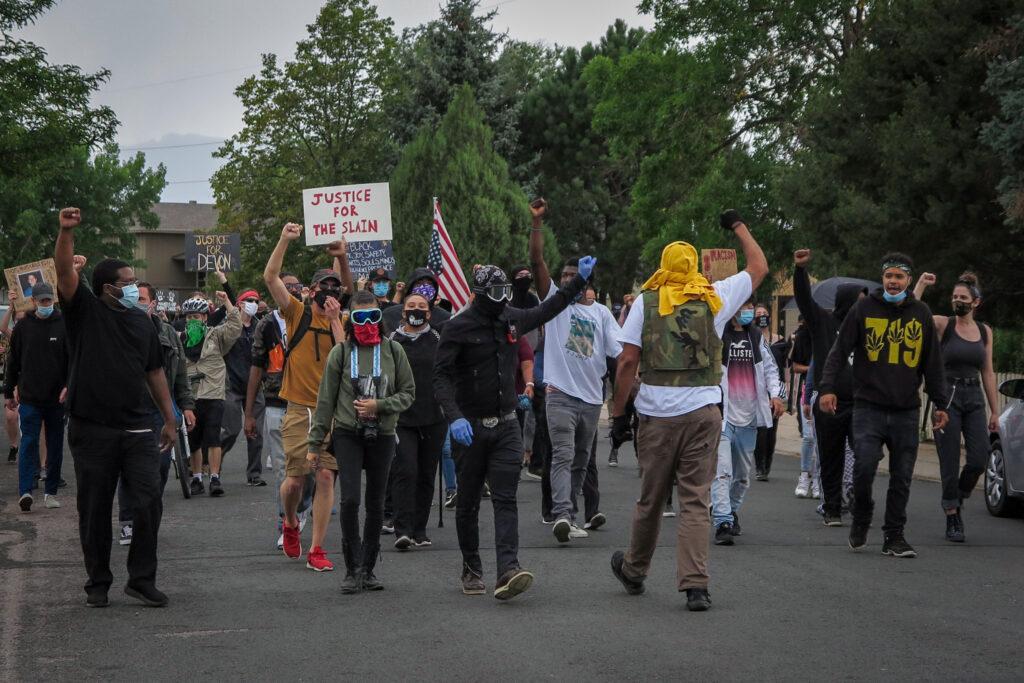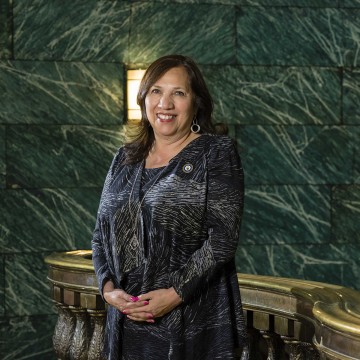John Christiansen is not afraid to push for change.
"We have this culture both in Colorado Springs and in the United States, that we just need cops as a solution to every social problem. We need to rethink that attitude," he said.
Christiansen is a social activist and organizer with a community hub called the Chinook Center. He said he interacts with Colorado Springs police officers a lot.
This past fall, Christiansen gave local media footage from a camera worn by an officer with CSPD that allegedly shows two cops joking about stoning people to death. He said he came across it when looking through a video related to his own 2021 arrest during a march for affordable housing.
The Colorado Springs Police Department is facing a number of allegations of police brutality, hostility and excessive force. The city said it's working to improve the relationship between citizens and the police and several years ago created a commission to help. But some remain unconvinced about its effectiveness.
In Christiansen's mind, the push for better relationships is a misguided public relations stunt.
"The problem isn't that there isn't enough engagement with the community," Christiansen said. "It's that their policies, practices, procedures at the police department need to change and they don't seem to be doing that. Or they're not telling us that they're doing that."
Christiansen said officers need to be held accountable.
"They don't feel fear that there's gonna be any reprisals. What gets them more is doing these releases to the media," he said referencing the video he gave to local media this fall. Otherwise, it's just going to stay in the dark and they're just going to keep operating this way that they have been operating."
In an email responding to Christiansen's comments, CSPD said the following:
"The Colorado Springs Police Department has had a good relationship with our community for many decades. This past year we were recognized by the International Association of Chiefs Of Police for our Play COS program which has handed out over 4,000 sports balls to children in our community. We have provided sports equipment to 15 schools and 3 community centers, along with holding 71 Play COS events. We don’t advertise the majority of these events because the goal is to have positive interactions between officers and the children in our community. This is just one program out of many that create avenues of conversation between the police department and our community. We understand that not everyone in the community is going to agree with how we provide police services. We value having dialogue with all of our community members. We have offered to Mr. Christiansen and others at the Chinook Center to come to some of these events and join in the conversation. As of this date, all of those invitations have been turned down."

Colorado Springs Police have faced a number of alleged race-motivated excessive force cases
Two other incidents alleging race-motivated excessive force have come to light in recent months. Six Colorado Springs Police officers are facing lawsuits. Another video has surfaced where law enforcement appear to alter the words to "we will rock you" to include threats of gassing people.
CSPD is investigating the claims and said proper action will be taken if they hold up.
Colorado Springs city councilor Yolanda Avila represents the southeast part of the city. It includes the neighborhood where police shot and killed De’Von Bailey in 2019. And among the recent lawsuits alleging excessive force, at least one is in her district.
"I feel really deep down that most of our officers are decent human beings, and they went into this line of work to protect and serve," she said. "But I think there's others, and especially in this climate in the last, I'll say six years of rage and fear and hate, that has penetrated into all areas of society. And it has hit the police department as well."
Bailey’s death, along with the deaths of other Black men across the country at the hands of police, sparked a series of protests in Colorado Springs and across the nation.

Some say a new commission focused on police transparency and accountability has 'no teeth'
That's when the city moved forward with an idea that had come up before — creating a citizen-led commission to advise the police department.
At the time, it was called the Law Enforcement Transparency and Accountability Commission or LETAC. Avila questioned the commission's value from the beginning saying "it had no teeth" and was "all optics."
Now, two and a half years later, Avila said the commission works really hard, but calls its effectiveness "lukewarm."

LETAC members are volunteers. There's no budget for expenses. They meet twice a month and don't have access to police records beyond what's publicly available. They can make recommendations to city council, but council has no oversight of the police department because the police department reports to the mayor's office.
Recently, the commission removed the word "accountability" from its name, adding "advisory" instead.
"Because they realized that they weren't holding anybody accountable," Avila said. "They have no power."
Steve Kern is a former Vice Chair of LETAC. His wife Nancy Henjum is a member of city council, which appoints LETAC members. Kern chose not to seek reappointment to the commission this fall. He said, theoretically, LETAC could be influential but that depends on how seriously the city council takes their recommendations.
" …and if they do things like voting on approving the recommendations," Kern said. "They're under no obligation to do that."
During Kern's tenure, LETAC successfully lobbied to increase funding and staffing for the city's crisis response teams which attend to 911 calls involving mental health emergencies. The group also focused heavily on a study evaluating CSPD's use of force policies. The report found Black residents are five times more likely than white residents to experience use of force at the hands of Colorado Springs Police, according to census data.
"I've had conversations with residents who've said things like, okay, so the cops pulled over somebody who had a license plate that was displayed incorrectly. If that person had been driving in a different part of town with a different kind of vehicle, if they had looked different, um, would they have been pulled over?" Kern said. "I don't know. But it's a reasonable question to ask."
That being said, researchers were careful to caution that data from the report cannot determine officers' intentions. The report also said there's work to be done in areas other than policing, too.
'This is not a one-way street'
Nevertheless, members of LETAC are trying to figure out how to ask those questions. That includes Dee Roy who became the chair of the commission in September.
"This is not a one-way street," Roy said. "For our community and our police to have better relations both of them need to come together."
He said he's not discouraged by the task ahead of him.
"I would love to have had a jackhammer and just went to work. However, I was given a hammer. So it might not be the best tool that I have right now, but I still have a tool to use," he said.
Some have suggested the city could benefit from an independent civilian oversight group or ombudsman in addition to LETAC, with more power to investigate police misconduct.
In a statement, Colorado Springs Mayor John Suthers said he supports investigations into allegations at the CSPD and said he does not think changes need to be made to LETAC. He also said he does not support an independent civilian oversight group, saying most citizens don't have the expertise necessary to apply informed oversight.








